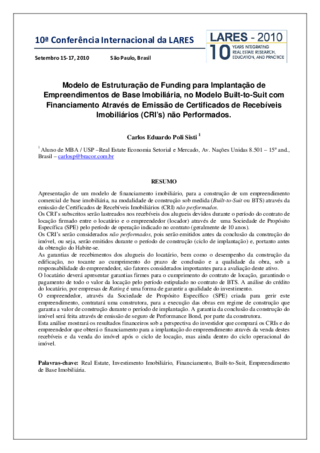comercial de base imobiliária, na modalidade de construção sob medida (Built-to-Suit ou BTS) através da emissão de Certificados de Recebíveis Imobiliários (CRI) não performados. Os CRI’s subscritos serão lastreados nos recebíveis dos alugueis devidos durante o período do contrato de locação firmado entre o locatário e o empreendedor (locador) através de uma Sociedade de Propósito Específica (SPE) pelo período de operação indicado no contrato (geralmente de 10 anos).
Os CRI’s serão considerados não performados, pois serão emitidos antes da conclusão da construção do imóvel, ou seja, serão emitidos durante o período de construção (ciclo de implantação) e, portanto antes da obtenção do Habite-se.
As garantias de recebimentos dos alugueis do locatário, bem como o desempenho da construção da edificação, no tocante ao cumprimento do prazo de conclusão e a qualidade da obra, sob a responsabilidade do empreendedor, são fatores considerados importantes para a avaliação deste ativo.
O locatário deverá apresentar garantias firmes para o cumprimento do contrato de locação, garantindo o pagamento de todo o valor da locação pelo período estipulado no contrato de BTS. A análise do crédito do locatário, por empresas de Rating é uma forma de garantir a qualidade do investimento.
O empreendedor, através da Sociedade de Propósito Específico (SPE) criada para gerir este empreendimento, contratará uma construtora, para a execução das obras em regime de construção que garanta a valor de construção durante o período de implantação. A garantia da conclusão da construção do imóvel será feita através de emissão de seguro de Performance Bond, por parte da construtora.
Esta análise mostrará os resultados financeiros sob a perspectiva do investidor que comprará os CRIs e do empreendedor que obterá o financiamento para a implantação do empreendimento através da venda destes recebíveis e da venda do imóvel após o ciclo de locação, mas ainda dentro do ciclo operacional do imóvel.
This paper presents the structure of a loan pattern for a Real Estate investment for rent, on a Built-to-Suit construction through issuance of Commercial Mortgage Backed Security (CMBS), non-performing. The underwritten non-performing CMBS will be backed on the receivable rentals during the period of the contract between the tenant and the landlord through a specially created third party that is called a Special-Purpose Vehicle (SPV) for contract period (usually ten years). The CMBS are considered non- performing because they will be issued before the building completion, i.e., they will be issued nearly the first month of construction schedule, and therefore prior to the utilization license, issued by the City-Hall (Habite-se). The CMBS are treated as conservative security investments, since the guarantee of the payments received, as well as the quality and fulfillment of construction deadlines are under the responsibility of the landlord and are an important fact in this analysis. The tenant must provide firm contract guarantee for the accomplishment of the rental, guaranteeing the payment of the full rental contract period according to Built-to-Suit. The tenant credit’s analysis made by a rating agency is one way to guarantee this credit. The landlord works through a SPV, which has been created to manage this investment, will hire a construction company to execute the work. The construction costs and the construction term will be guarantee by Performance Bond surety. This analysis will give the perspective of investments as for the investor, who will acquire the CMBS, as for the entrepreneur, who will obtain the loan for implementing the investment through the sale of these CMBS and the building at the end of the contract term.
